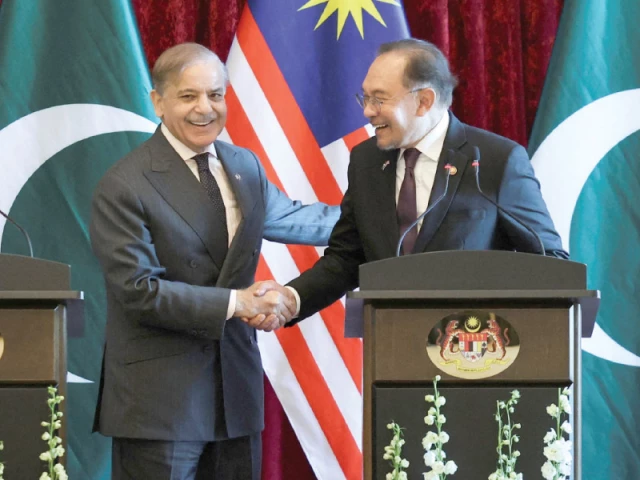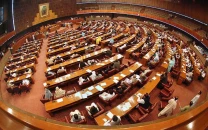Pakistan, Malaysia seal six accords to boost ties
Shehbaz, Anwar unveil $200m Halal export deal, vow to deepen economic, cultural cooperation

Pakistan and Malaysia on Monday renewed their long-standing friendship with a flurry of high-level engagements, culminating in the signing of six significant accords to bolster cooperation across trade, education, Halal certification, anti-corruption, and tourism.
The signing of the six memoranda of understanding (MoUs) during the visit by Prime Minister Shehbaz Sharif marks a decisive step toward a deeper strategic partnership rooted in shared economic goals and Islamic solidarity.
Prime Minister Shehbaz, currently on a three-day official visit to Malaysia at the invitation of Prime Minister Anwar Ibrahim, was accorded a ceremonial welcome at the Perdana Putra Complex, complete with a guard of honour by the Malaysian armed forces.
Both leaders later led delegation-level talks that spanned a wide range of areasfrom economic reform and higher education to regional security and global peace efforts. Following the talks, the two leaders witnessed the exchange of MoUs.
The MoUs covered collaboration on higher education, training of diplomats, tourism promotion, Halal certification, anti-corruption efforts, and support for small and medium enterprises (SMEs).
The ceremony, held at the Prime Minister's Office in Putrajaya, was attended by senior ministers and officials from both sides, including Deputy Prime Minister Ishaq Dar, Information Minister Attaullah Tarar, and Malaysia's Foreign Minister Mohamad Hasan.
At the heart of the renewed partnership lies an ambitious economic agenda. Malaysia announced plans to import $200 million worth of Halal-certified meat from Pakistana move seen as a landmark development in bilateral trade.
Prime Minister Shehbaz assured his Malaysian counterpart that Pakistan would "compete on price, quality, and commitment," vowing to not only meet but exceed the target.
"You announced a quota of $200 million for meat exports from Pakistan to Malaysia," he said. "Let me assure our Malaysian partners that we will meet every condition of Halal certification and surpass expectations. When consumers are satisfied, the sky is the limit."
Shehbaz also underscored Pakistan's potential as the world's fifth-largest producer of cotton and milk, and the fourth-largest producer of mangoes, inviting Malaysian investors to tap into value-added agriculture and food processing.
"Our mangoes are among the best in taste worldwide," he remarked, suggesting joint ventures to develop SME-based processing units for export. Malaysia, in turn, expressed its interest in boosting palm oil exports to Pakistan.
Meanwhile, speaking at the PakistanMalaysia Business and Investment Conference, attended by entrepreneurs from both nations, Prime Minister Shehbaz Sharif emphasised that sustainable economic progress hinged on private enterprise rather than state intervention.
"It is the private sector that must drive the engine of growth," he said. "Governments can only lay the foundation and provide the framework. Business must be run by business houses, enterprises, and expertsnot by government."
He lauded Malaysia's economic transformation under Anwar Ibrahim's leadership, describing it as "nothing less than a miracle," and expressed confidence that Pakistan could achieve similar results through consistency, investment, and regional cooperation.
Currently under an International Monetary Fund (IMF) programme, Shehbaz said Pakistan aimed to achieve economic independence within two years. "If entrepreneurs from both sides commit to joint ventures and lasting partnerships, we can say goodbye to the IMF forever," he said.
Both leaders agreed to expand cooperation in information technology, telecommunications, the Halal industry, automotive production, green energy, tourism, higher education, and agriculture. They also discussed collaboration in electrical and electronic manufacturing, connectivity, and climate change mitigation.
The prime ministers reaffirmed their intention to strengthen ties under the Association of Southeast Asian Nations (ASEAN) framework, with Malaysia reiterating its support for Pakistan's bid to become a Full Dialogue Partner of the regional bloc.
In recognition of Malaysia's leadership role in ASEAN, Shehbaz congratulated Anwar Ibrahim on his country's assumption of the chair and expressed Pakistan's readiness to contribute meaningfully to regional trade and stability.
Regional and international issues dominated part of the discussions. The two leaders condemned the continuing Israeli aggression in Gaza and reaffirmed their call for "concrete international action" to end Palestinian suffering.
Prime Minister Anwar Ibrahim noted that both countries shared a moral and political responsibility to uphold justice and peace in the Muslim world. He expressed appreciation for Pakistan's constructive role in regional peace efforts, including its consistent stance on Palestine.
The Malaysian leader also underscored that "peace between Pakistan and India was vital for regional stability," and acknowledged Pakistan's position on Kashmir, reaffirming Malaysia's support for a peaceful settlement in accordance with United Nations resolutions.
Both sides agreed to maintain close consultation on international developments and to strengthen cooperation at multilateral forums such as the United Nations (UN) and the Organization of Islamic Cooperation (OIC).
A symbolic highlight of the visit was the joint launch of the Urdu translation of Anwar Ibrahim's seminal book 'SCRIPT: For a Better Malaysia', which outlines his vision for leadership and reform.
Shehbaz praised the work as "a guiding framework for Malaysia's Madani vision" and a source of inspiration for nations pursuing sustainable and inclusive development. He also acknowledged Malaysia's translation of Allama Iqbal's works into Malay last year, calling it a "bridge of intellect and culture" between the two nations.
"Iqbal's philosophy of self-realisation and discovery shows that nations are built through hard work and unwavering commitment, not magic wands," he remarked. In response, Anwar Ibrahim praised Pakistani professionals, students, and skilled workers for their contributions to Malaysia's progress, describing them as "an integral part of the Malaysian development landscape."
Later, speaking on behalf of the Malaysian government, Communications Minister Fahmi Fadzil, said that the meeting between the two leaders reaffirmed "a strong bond of friendship and a shared aspiration to build a more dynamic and resilient partnership."
"Close cooperation between Malaysia and Pakistan will not only expand economic opportunities," he said, "but also strengthen the unity of the Islamic world through trade, investment, and a sustainable Halal industry."
He added that both countries remained committed to strengthening the Malaysia-Pakistan Closer Economic Partnership Agreement (MPCEPA) and enhancing mutual recognition of Halal certification standards.
Before concluding his visit, Shehbaz Sharif expressed gratitude for Malaysia's "exceptionally warm" hospitality, calling the country his "second home." He said: "I leave Malaysia far more informed and inspired by its development journey."
He stressed that Pakistan, too, with its abundant resources and resilient people, can and will chart a path of prosperity and self-reliance. "Together, Pakistan and Malaysia will achieve shared goals grounded in faith, friendship, and forward-looking cooperation."























COMMENTS
Comments are moderated and generally will be posted if they are on-topic and not abusive.
For more information, please see our Comments FAQ